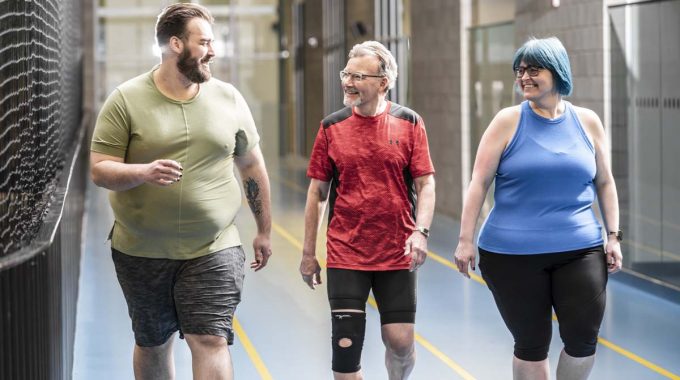Imagine having your home, job, family, community, and country taken from you and having to…

7 Dimensions of Wellness
Health is more than just muscle tone. It is a dynamic and conscious growth of the entire self. At the Y, we believe that health and wellness go beyond physical fitness, and incorporates the entire body, mind, and spirit. Wellness is related to goals, decisions, and actions that contribute to a condition of optimal well-being so that you thrive rather than just survive.
Seven different aspects of wellness are considered to exist: physical, emotional, environmental, spiritual, social, occupational, and intellectual. These factors interact and have an impact on one another. The other dimensions of our well-being are impacted when one dimension is out of balance.
In order to achieve well-being, one must adopt a proactive mindset, learn how to be healthy in each dimension, and take steps to establish routines, habits, and coping mechanisms that promote wellness.
Read more about each dimension below, and how you can work towards a balanced well-being.
PHYSICAL WELLNESS
Physical wellness focuses on typical health and fitness activities, such as healthy eating, exercise, and other activities that support physical health. Physical well-being includes things like eating complete foods, exercising frequently, and developing healthy habits that will enable you to live a longer, happier life.
Strategies to enhance your physical wellness:
- Make exercise a regular part of your life by aiming for 150 minutes or more of moderate aerobic activity each week.
- Get enough rest (7-8 hours per night).
- Replace sports drinks and other sugar-filled beverages with water.
- Try to eat more wholesome, fresh foods, rather than processed foods.
EMOTIONAL WELLNESS
The ability to recognize and express emotions appropriately, including validating and managing emotions constructively, is at the center of emotional wellness. Positivity and being open about one’s feelings with a friend or trained expert might enhance emotional wellness.
Strategies to enhance your mental wellness:
- Practice mindfulness to acquire the mental condition of not dwelling on the past or the future, but instead keeping your consciousness on the now.
- Use self-care and relaxation techniques that are effective for you.
- Ask for assistance from your family, friends, the community, or a professional.
- Know who to contact in a crisis.
ENVIRONMENTAL WELLNESS
Your environment plays an important role in your well-being. Environmental wellness is how your environment positively affects your wellness. It can include connecting with nature, keeping your space organized, and reducing environmental hazards.
Strategies to enhance your environmental wellness:
- When you can, take advantage of the outdoors to engage in healthy physical activity, such as walking through parks or studying outside.
- Eat locally grown and produced food.
- Avoid exposure to environmental dangers like UV radiation, secondhand smoking, and excessive noise.
- Try to keep a tidy living environment.
SPIRITUAL WELLNESS
To achieve spiritual wellness, one must look for meaning and purpose in the every day, and seek values that help give direction to our lives. This can include practices like contemplation, prayer, and time spent in nature.
Strategies to enhance your spiritual wellness:
- Spending quality time with loved ones will help you develop your relationships with others.
- Connect with nature by taking a walk outside and focusing on your breathing.
- Spend some quiet time in meditation or reflection.
- Look into local faith based communities.
SOCIAL WELLNESS
Social wellness is how we interact with our community and those around us. Developing healthy relationships with friends and family and fostering harmony in these connections are key to social wellness. It includes consent, communication skills and support systems.
Strategies to enhance your social wellness:
- Look for opportunities, and be open to experiencing new things and meeting new people (e.g. join a club or organization, play a team sport, volunteer, etc.).
- To better comprehend different cultures and customs, pay attention to others and ask questions.
- Recognize the importance of consent in all facets of your social life, including interactions with peers, new friends, and romantic relationships.
- Participate in community service.
OCCUPATIONAL WELLNESS
Occupational wellness promotes job satisfaction while managing other obligations in one’s life. Getting work in a rewarding profession, or improving employment abilities through further education can contribute to occupational wellbeing.
Strategies to enhance your occupational wellness:
- Know how to strike a balance between work and play.
- Work according to your unique learning preferences.
- Feel inspired and challenged by your work, and appreciate the work you’ve done at the end of the day.
- Set goals, make a plan for achieving them, and then get to work on the plan.
INTELLECTUAL WELLNESS
The pursuit of new ideas, the development of existing abilities, and the application of novel approaches to problems are all encouraged by intellectual well-being. Continuous learning is key for this aspect of wellness as it challenges and grows intellect.
Strategies to enhance your vocational wellness:
- Obtain a range of experiences to broaden your knowledge.
- Learn which approaches are most effective for you and identify any areas where you require support.
- To focus on your interests and the kind of work you want to be doing, volunteer for new experiences.
- Do your best to avoid comparing your journey to others’ paths; they are all unique.
At the Y, we know the best prescription for wellness is belonging. More than a gym, pool, or a place for fitness, YMCA Members experience a sense of belonging, achievement, and friendship that is hard to find anywhere else.
Last month, the YMCA of Simcoe/Muskoka supported over 14,000 individuals in their health and wellness journey through our Health, Fitness & Aquatics programs. To learn more about how to start your journey with the Y, visit our website at www.ymcaofsimcoemuskoka.ca/membership/.


